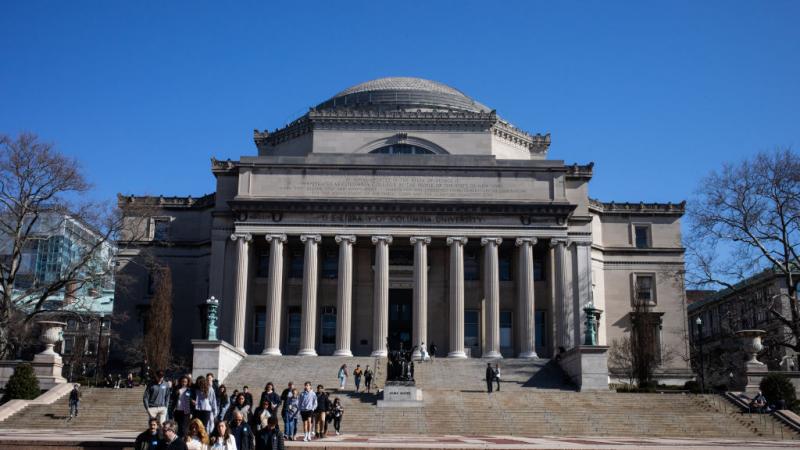Judge upholds Virginia school district antiracism policy, claims it's like banning the n-word
Still pending, however, is a former administrator's lawsuit accusing Albemarle County Public Schools of fostering racially hostile environment that led her to quit to "preserve her mental health."
A Virginia court dismissed a lawsuit against a school district for allegedly indoctrinating children in the worldview of critical race theory, teaching them to "dismantle the dominant white, Christian culture" and treating them differently based on race and religion.
While the parents suing Albemarle County Public Schools deemed its antiracism policy "racist at its core," Circuit Court Judge Claude Worrell compared the policy to teaching children not to use the n-word, according to a Daily Progress report on Friday's hearing.
It's a mixed victory for the district surrounding the University of Virginia, because a former assistant principal filed suit earlier this month alleging she was fired for opposing the antiracism policy.
The curriculum, based on the "Courageous Conversation" protocol developed by author Glenn Singleton, "sets up a classic Catch-22, in which a white person's objections to the content of the curriculum are simply evidence that he or she is a racist who needs further training on the curriculum," according to the complaint by Emily Mais.
Parents sought a preliminary injunction in February. They claimed the district was expanding a middle school pilot program, which classified students by race and divided them into "perpetually privileged" and "perpetually victimized" groups, to every subject and grade level.
Children are learning antiracism "as an objective description of the world," and they can be punished for purportedly racist behaviors such as denying they have "white privilege," according to the motion, which several parents supported in filed declarations.
Judge Worrell didn't buy the plaintiffs' argument that the lessons went beyond teaching students about racism by "personalizing it to students in the room," in the words of the Daily Progress report.
"You never tell the court what the problem is" with what he called "a conceptual framework for a discussion to teach children," Worrell told attorneys for the Alliance Defending Freedom (ADF), which is representing both the parents and Mais.
He echoed the district's argument that the parents don't have standing to sue and can't show harm to their children. "There must be something that triggers your ability to come to court" beyond the policy's implementation, the judge said.
Creating antiracist "vision statements" has a pedagogical purpose, Worrell said: "The very act of educating changes children's lives," including by teaching them not to use racial slurs.
"It's just not true" that the policy discriminates against white students, he said, as opposed to making "certain people ... uncomfortable about history and their place in it."
ADF senior counsel Dave Cortman told Just the News the dismissal was "disappointing" but the public interest law firm planned to appeal. "Every student deserves to be treated equally under the law, regardless of their race, ethnicity, or religion," he said.
District spokesperson Phil Giaramita cheered the ruling for finding no evidence of "concrete harm from the implementation of our anti-racism policy." He said the district would respond to Mais "in the appropriate legal forum as soon as possible."
Mais' lawsuit claims she was "branded a racist, severely and pervasively harassed, relentlessly humiliated, and ultimately compelled to resign from a job that she loved to preserve her mental health" last fall.
Staff went through mandatory orientation on the policy, which included a video with antiracism popularizer Ibram Kendi. Assistant Superintendent Bernard Hairston warned employees in another video they could either get on the "antiracism school bus" or "get off the bus."
Mais went through another mandatory training with the author Singleton, the suit claims, reprinting some slides.
At a mandatory meeting with administrators, Hairston characterized parents who complained about the antiracism policy as "slave owners who had raped his mother and sister, beaten him, and were now telling him not to talk about it." No one objected to his comments, which "further created a toxic and racially hostile environment," the suit says.
Mais' accidental use of "colored" rather than "people of color" in the final training session, for which she quickly apologized, prompted immediate and continuing verbal abuse from a black employee and her allies, calling her epithets such as "white racist bitch" in front of others.
Hairston convened an unrecorded meeting with Mais and the black employee. Guidance counselor Emily Holmstrom, who was also present, said white employees should be afraid to say things that were not "appropriate."
This confirmed to Mais the district was "policing white participants' speech and was prepared to retaliate against any criticism of its approach," the suit says.
She decided to resign after Hairston told her to apologize again, this time to the entire staff, and said a communications officer told her to lie about why she was leaving.
Mais "reluctantly" agreed to apologize at her final staff meeting, but officials vetoed her proposed statement, which explained the hurt she felt, for responding "like a typical defensive white person." The school allegedly invited black but not white teacher's aides to that meeting, where the black employee warned staff "she was watching them for perceived racist behavior."
The Albemarle antiracism policy resembles a Nevada charter school's civics curriculum that also prompted a legal challenge, albeit in federal court.
While Democracy Prep at the Agassi eventually let biracial William Clark graduate without completing the class, he and his mother Gabrielle are suing for compensatory and punitive damages, citing harm to his college prospects, compelled speech and emotional harm.
The case had been dormant for several months until mid-April, when the Clarks asked the federal court to consider a new "relevant authority."
The 5th U.S. Circuit Court of Appeals, which governs Louisiana, Mississippi and Texas, ruled in favor of a student who cited her race and religion as grounds for her objection to an assignment to transcribe the Pledge of Allegiance.
Judge James Ho wrote the teacher coerced her into "expressing a particular position," and confirmed the assignment "served no legitimate pedagogical purpose," by telling the class he'd give her a "zero" grade and lecturing her on America's superiority to other countries.
The Facts Inside Our Reporter's Notebook
Documents
Videos
Links
- lawsuit
- deemed its antiracism policy "racist at its core"
- Daily Progress report
- antiracism policy
- author Glenn Singleton
- complaint by Emily Mais
- preliminary injunction
- several parents supported in filed declarations
- another video
- parents who complained about the anti-racism policy
- Nevada charter school's civics curriculum














